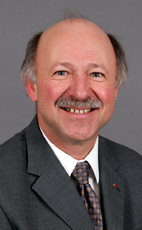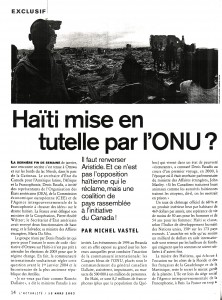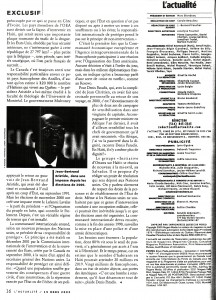This is an English-language translation of the article published in L’Actualité in 2003:
Haiti put into trusteeship by the United Nations?
by Michel Vastel, L’Actualité, 15 March, 2003
We must overthrow Aristide. And it’s not the Haitian opposition who say this, but a coalition of countries gathered at the initiative of Canada.
The last weekend of January, a secret meeting was held in Ottawa and on the edges of Meech Lake in Gatineau Park. Secretary of State of Canada for Latin America, Africa and La Francophonie, Denis Paradis, invited representatives of the Organization of American States (OAS), the European Economic Commission (EEC) and the Agence intergouvernementale de la Francophonie a “brew of ideas” on the Haitian tragedy. France had delegated Minister for Cooperation Pierre-Andre Wiltzer, the American Secretary of State had sent two high-ranking officials, and El Salvador, his foreign minister, Maria Da Silva.
The group convened by Denis Paradis (and which is currently code-named the “Ottawa Initiative on Haiti”) is not prepared to wait for the 2005 elections so that the regime change. In fact, the international community would resolve this issue before January 1st, 2004 and the bicentennial of the oldest republic in the Caribbean.
“I do not want to end up like Romeo Dallaire,” said Minister Paradis to its guests. The events in Rwanda in 1994 have indeed made clear the horror of inaction by the international community: the United Nations peacekeepers, under the command of Canadian General Dallaire, attended powerless to massacre 500000 to a million people.
In Haiti, there are 8.2 million francophones (more than the population of Quebec) who live in abject poverty “écoeurante”, noted Denis Paradis during a first trip in 2000, when he was Parliamentary Secretary to the Minister of Foreign Affairs John Manley. “If Canadians treat their animals like authority, dealing Haitian citizens,” he said, “we will put them in prison.”
An official unemployment rate of 60% and a gross domestic product per capita of 469 dollars per year, a life expectancy of less than 50 years for men and 54 years for women: Haiti ranks, according to the Index Human Development of the United Nations, the 150th of the 173 countries inventoried. Anarchy is such that at least one billion dollars in assistance are accepted by the international donors, who fear that the money could be used for other purposes.
The misery of the Haitians who fails at the coasts of Florida and the French islands of Guadeloupe and Martinique, is the best kept secret on the planet. The island is near the headquarters of the Intergovernmental Agency of La Francophonie in Paris. France is too concerned about what’s happening in Cote d’Ivoire. Member countries of the OAS are divided on how to intervene in Haiti, which is also a major hub of drug trafficking. And the United States, obsessed with their internal security, not interested in this little republic of 27797 km2 – smaller than Belgium – without oil, without strategic interest, where people speak French furthermore…
But the November 2000 elections have created a stalemate between the Lafanmi Lavalas – the party of the president – and the Organization of the People in Struggle, which controls Parliament. Since then, it is a real reign of terror which was installed.
The international community, according to a new principle of the UN, rely on its “responsibility to protect”. This principle was established in December 2001 by the International Commission on Intervention and State Sovereignty, which was established by Canada in September 2000, following an appeal by the UN secretary-general. The responsibility to protect is thus defined: “When a population suffers severely from the consequences of civil war, insurgency, repression by the State or the failure of its policies, and that the State in question is unwilling or unable to put an end to these sufferings or to avoid them, international responsibility to protect takes precedence over the principle of non-intervention. ”
It was the first time that the European Economic Community and the Intergovernmental Agency of La Francophonie participated in a meeting with the Organization of American States. No decision was on the agenda, but in French diplomatic circles, it indicates that there has been much talk of some kind of “formal guardianship”, as in Kosovo.
 For Denis Paradis, who, with the help of Jean Chretien, had made a personal crusade for the return of his trip, in 2000, was the culmination of more than two years of campaign in twenty capitals. Accompanying the Prime Minister in Africa last year, it had alerted all government leaders he met. “In Africa I have seen poverty with dignity,” says Denis Paradis. In Haiti, there is even more dignity! ”
For Denis Paradis, who, with the help of Jean Chretien, had made a personal crusade for the return of his trip, in 2000, was the culmination of more than two years of campaign in twenty capitals. Accompanying the Prime Minister in Africa last year, it had alerted all government leaders he met. “In Africa I have seen poverty with dignity,” says Denis Paradis. In Haiti, there is even more dignity! ”
The”Ottawa Initiative on Haiti” will meet again in mid-April in El Salvador. He intends to draft a resolution to be tabled at the UN. There surely speak of respect for human rights and restoring the rule of law. Even if the UN did not want this kind of intervention would lead to a military occupation, it may be inevitable until elections have been held. The international community should then, as at the end of 1990, monitor the implementation of a police force and an army of democracy.
The needs are enormous: the population, 80% of whom live below the poverty line, has no access to water or electricity. And time is running out because it is estimated that the number of people in Haiti could reach 20 million by 2019. Twenty million francophones, in a state of abject poverty, at the gates of America. “It’s a time bomb that must be defused immediately,” says Denis Paradis.



Leave a reply
You must be logged in to post a comment.